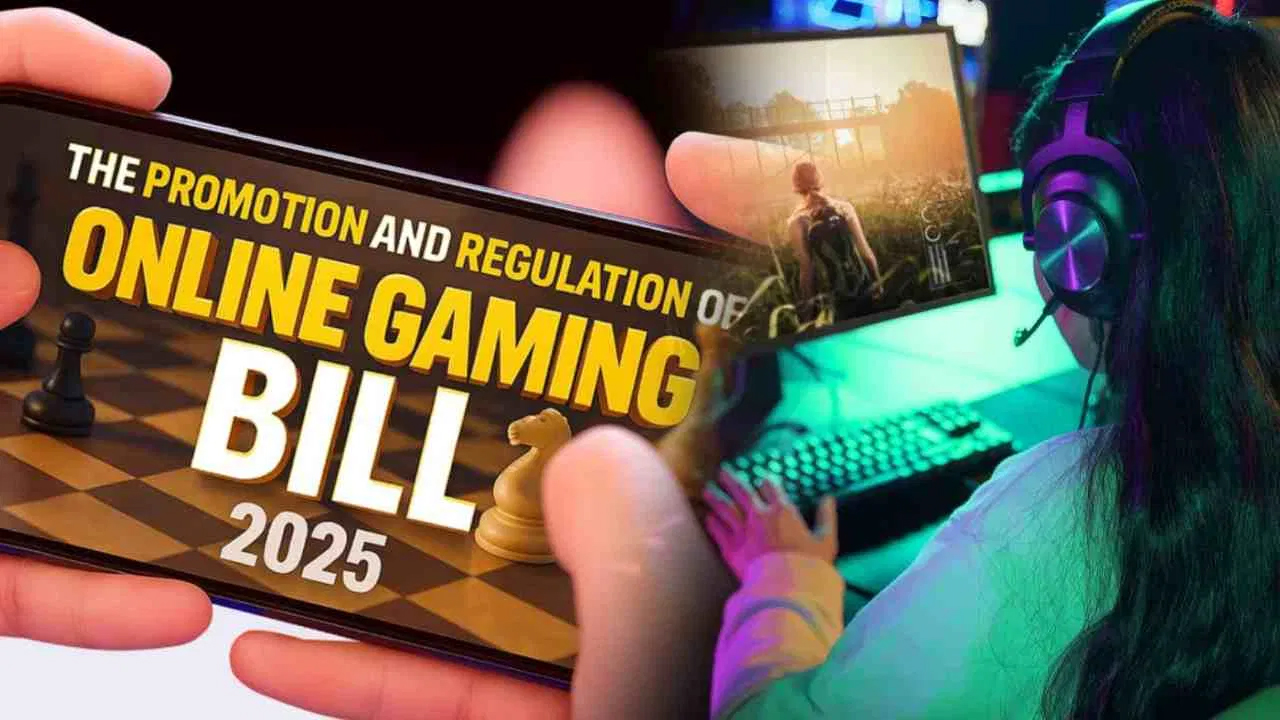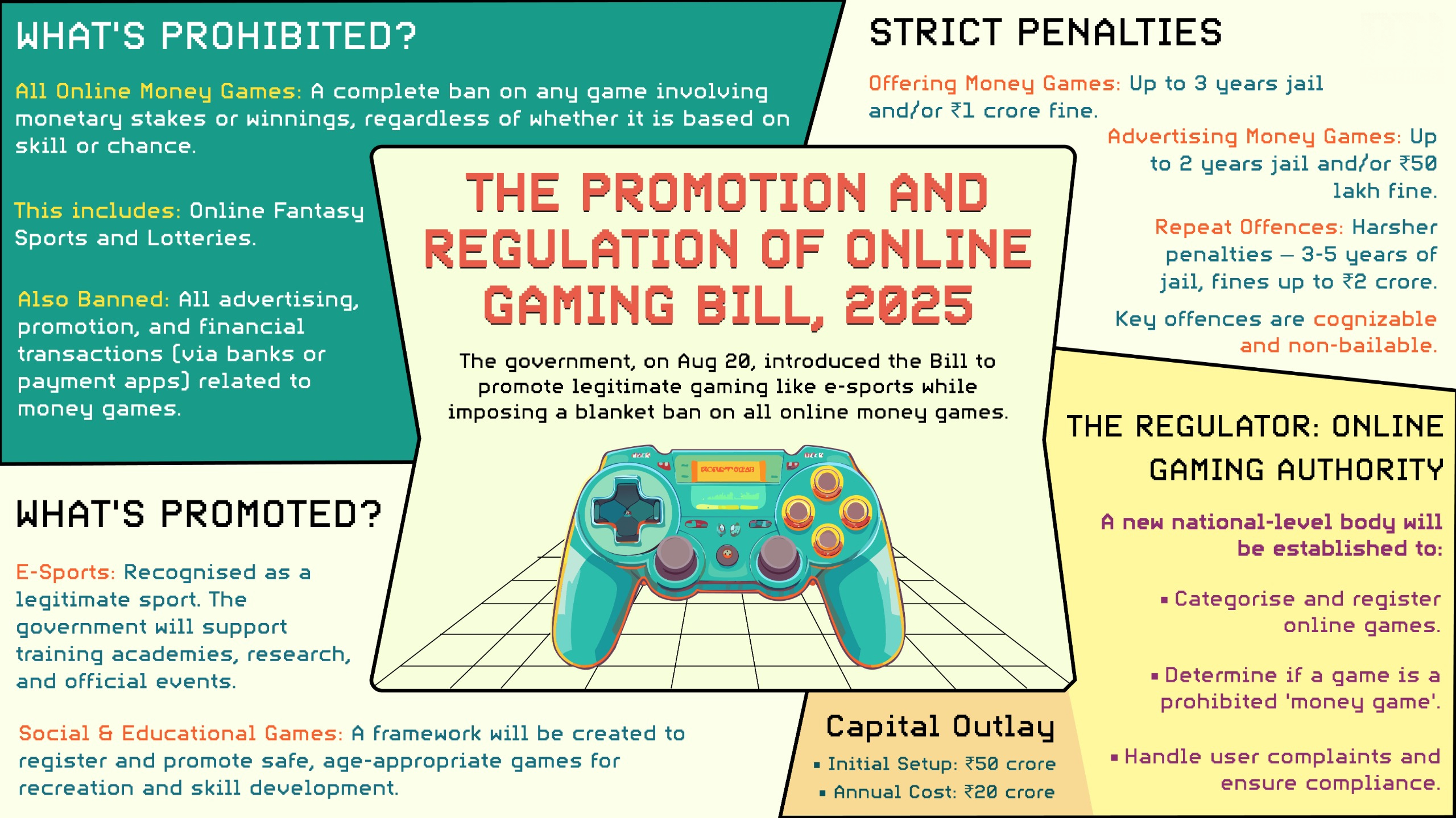Introduction:
The digital economy in India has grown rapidly over the last decade. Along with opportunities in e-commerce, fintech, and digital education, online gaming has become a major sector. This industry combines entertainment, technology, and entrepreneurship but also raises concerns related to addiction, fraud, and consumer protection.
- In this context, Parliament passed the Promotion and Regulation of Online Gaming Act, 2025 after a very short debate. The law is significant because it attempts to regulate the entire online gaming ecosystem while imposing a blanket ban on all online money-based games such as poker and rummy. The move has created strong debate around legality, constitutional powers, and individual liberty.
Why is the Online Gaming Act in the News?
The Bill received the President’s assent on August 22, 2025. Its objective is twofold:
1. Promote and regulate segments like e-sports and online social games.
2. Impose a total ban on real-money online games, where users pay or stake money in expectation of financial returns.
This attempt to draw a sharp line between “gaming” and “gambling” is at the heart of the controversy.
Key Provisions of the Online Gaming Act, 2025:
1. Ban on Online Real-Money Games
-
- The Act cites serious social, financial, and psychological harms, especially among young people and disadvantaged groups.
- It highlights manipulative design, addictive algorithms, and bots used by online money platforms that create compulsive behaviour leading to financial ruin.
- The Act cites serious social, financial, and psychological harms, especially among young people and disadvantaged groups.
2. Financial Fraud and Money Laundering
-
- The government links unchecked online money gaming with tax evasion, money laundering, and even terror financing.
- It argues that banning such platforms is necessary for national security and financial sovereignty.
- The government links unchecked online money gaming with tax evasion, money laundering, and even terror financing.
3. Definition of Online Money Games
-
- Defined as a service where a user pays fees, deposits money, or stakes something of value for the chance of monetary or other enrichment.
- Popular platforms like Dream11, MPL, Winzo fall within this scope.
- E-sports are excluded from this definition.
- Defined as a service where a user pays fees, deposits money, or stakes something of value for the chance of monetary or other enrichment.
4. Recognition of E-Sports
-
- The Act treats e-sports as a legitimate competitive sport.
- Games based on skill, physical dexterity, mental agility, and strategy are permitted, with entry fees and prize money allowed.
- The government plans to set up training academies, research centres, and promotional schemes for e-sports.
- The Act treats e-sports as a legitimate competitive sport.
5. Creation of a Central Authority
-
- A new central regulatory authority will oversee online gaming.
- It will categorise and register social games and decide whether a game qualifies as an “online money game”.
- The authority will also promote recreational and educational gaming initiatives.
- A new central regulatory authority will oversee online gaming.
6. Powers of Search and Seizure
-
- Authorised officials can search physical and virtual spaces without a warrant.
- “Any place” includes computer resources, servers, digital storage, and even encrypted platforms.
- Authorised officials can search physical and virtual spaces without a warrant.
7. Penalties and Enforcement
-
- Offering online money games can lead to 3 years in prison and fines up to ₹1 crore.
- Repeat offenders face up to 5 years jail and fines up to ₹2 crore.
- Influencers or celebrities promoting such games can be jailed for 2 years and fined ₹50 lakh.
- Banks and financial institutions are prohibited from processing transactions related to banned games.
- Offering online money games can lead to 3 years in prison and fines up to ₹1 crore.
Constitutional Debate on Union Powers:
The Indian Constitution divides legislative subjects between Union and States:
- Union List – Defence, foreign affairs, communications, etc.
- State List – Public health, betting, gambling, entertainment.
- Concurrent List – Areas where both can legislate, with Union laws prevailing.
“Sports and games” fall under the State List. Similarly, public health, betting, and gambling are also state subjects. This makes the Act controversial, since it centralises power in a field reserved for states.
The Union justifies its move by citing public interest—particularly cyber risks, addiction, and financial fraud. Critics argue that this stretches constitutional boundaries and sets a precedent for central overreach.
Why Treat Online and Offline Games Differently?
A major point of debate is why offline rummy or poker is legal in many states, but the same games online are banned.
- Offline Games
- Bound by the mathematical probability of cards.
- Physical presence makes fraud and identity theft harder.
- Online Games
- Algorithms may be coded to favour the house.
- Players can hide identities, create fake accounts, or use bots.
The government argues that this technological distinction justifies stricter regulation. However, the question remains whether this classification meets constitutional standards of fairness and proportionality.
Proportionality Test and Fundamental Rights:
In Indian constitutional law, restrictions on rights must pass the proportionality test:
1. Serve a legitimate purpose.
2. Be rationally connected to that purpose.
3. Use the least restrictive means.
4. Balance state interests with personal freedom.
Critics argue that a total ban is excessive. Alternatives like licensing, spending caps, and transparency mechanisms could achieve the same goals without curtailing individual liberty.
Alternatives to a Blanket Ban:
Several policy options could balance innovation with protection:
- Licensing Regime: Allow online money games under strict government regulation.
- Age/KYC Verification: Prevent underage participation.
- Spending Caps: Put limits on daily or monthly stakes.
- Algorithm Audits: Ensure transparency and fairness in gameplay.
- Taxation: Bring revenue into the formal economy rather than pushing activity underground.
Risks of Pushing Games Underground
Prohibiting an activity does not remove demand. Instead, it may:
- Encourage illegal platforms accessed through VPNs.
- Lead to untaxed and unregulated activity.
- Expose players to greater fraud and exploitation.
This creates the danger of a shadow economy, weakening both regulation and revenue collection.
Wider Social and Economic Concerns:
- Mental Health: Addiction support through counselling and awareness may be more effective than prohibition.
- Employment: Many youth turn to online money games due to lack of secure jobs. Broader employment generation could address this.
- Digital Economy Growth: The gaming sector has potential for innovation and global investment. A ban may stifle opportunities.
- Individual Liberty: At a philosophical level, the debate is about whether adults in a democracy should have the freedom to choose how they spend their time and money.
Conclusion:
The Promotion and Regulation of Online Gaming Act, 2025 reflects the government’s attempt to address the risks of online gaming, but it also highlights challenges of federalism, proportionality, and liberty. While the dangers of addiction and fraud are real, a blanket ban on real-money games may not be the best solution.
| Main question: The Promotion and Regulation of Online Gaming Act, 2025 raises fundamental questions of legislative competence and federalism in India. Examine this statement in the light of constitutional provisions regarding the division of powers between Union and States. |








